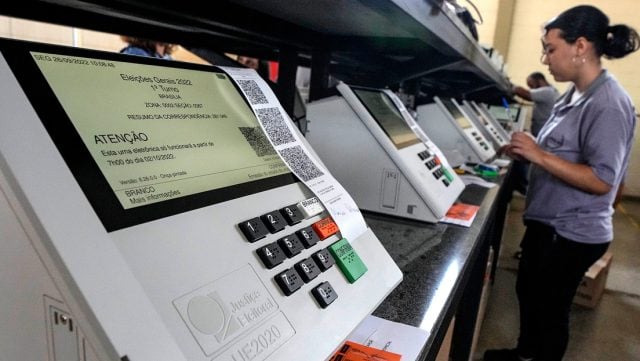As a last gesture before the electoral process on Sunday, the Superior Electoral Court (TSE) of Brazil opened the doors of the ‘counting room’ so that politicians and officials of the Government of Jair Bolsonaro could visit it.
The visit, which took place on Wednesday, was led by the president of the TSE, Alexandre de Moraes, who reiterated what he has said, over and over again in recent years, to refute the constant attacks by the far-right president: Brazil’s electoral system is » transparent and auditable”, explains the journalist Nazareth Balbás for RT.
The activity sends a very strong message of what is at stake on Sunday. Beyond the fact that the elections take place in an ultra-polarized scenario between the Left and the Right, there is real concern about Bolsonaro’s ability to delegitimize the electoral process, as he has done after coming to power.
The president’s attacks and his personal clashes with the TSE authorities have not only earned him a judicial investigation, but also raise alerts before the possibility that he may call to emulate the assault on the Capitol in the US staged by the supporters of Donald Trump, when they ignored the results that gave Democrat Joe Biden the presidency of the United States.The points of conflict in Brazil
Bolsonaro says that the electoral system in Brazil can be violated, that the electronic vote should be replaced or complemented by a printed alternative, that the ballots cannot be audited and has even suggested that there was «fraud» in the elections that led him to occupy the highest government post. According to him, in 2018, he got enough votes to win the elections in the first round so as to avoid the second round.
His accusations have more media ‘shots’ than sustenance. Despite the fact that in the middle of this year Bolsonaro summoned a large part of the diplomatic personnel accredited in Brazil to formalize his distrust of the electoral system, without presenting conclusive evidence, the TSE has refuted his accusations and warns that what the far-rightist intends to do is undermine the democratic system.
Bolsonaro’s tantrums are not new, but they have forced the TSE to carry out a series of activities to defend itself from the accusations of the president, who despite his strategies has not managed to overcome the favorite in the polls: the leftist Luiz Inácio Lula da Silva.
«We paid a visit to the data ‘counting room’ exactly to show the obvious, but always important, which is how we act with transparency, with loyalty to all those who are part of this electoral process, to demonstrate that an open room, a clear and transparent room, is not a secret or dark room», said Moraes to the press yesterday.
The words of the president of the TSE were addressed to Bolsonaro. Last week, the president assured that there was a room in the court in which «nobody knows what happens inside», after suggesting that the presence of the Armed Forces and other authorities in the room could reduce «the possibilities of diversion [of ballots] because of corruption”.
Yes, just ‘reduce’. For Bolsonaro, the only way to bring the alleged possibilities of «fraud to zero» is through the printed vote, in a country that has been a pioneer in the automation of its electoral processes for decades.A country at the forefront
Although electronic voting in Brazil was introduced in 1996, the country implemented a pilot project in six states for the use of automated means of totalization of votes since 1989.
By the year 2000, 100% of the electoral ballot boxes in Brazil were electronic, which represented an important advance with respect to the rest of the region and has allowed the South American country to perfect its electoral system, recognized as one of the fastest, reliable and safe in the world. In the 25 years that it has been in operation, there is no record of fraud or infringement.
This transition made it possible to leave in the past the problems of the manual system, which for many years was the ‘gateway’ to fraud in Brazil, the proliferation of invalid votes due to human errors, the slowness in data transmission and inconsistencies when auditing.
But that has not prevented Bolsonaro from insisting on defending the printed vote and accusing the Supreme Court judge, Luís Roberto Barroso, of having worked inside the Chamber to stop its implementation. «Another improper interference by a member of the STF within parliament», asserted the far-right leader last week.Reliable, fast and auditable
Voting machines in Brazil have a numeric keyboard that the voter presses with a two-digit code that corresponds to the option of their choice. Once the number has been entered, the candidate’s photo appears on the screen and the voter only has to press a green button to confirm their selection.
The ballot box is not connected to the internet and only has the function of counting the votes. At the end of the election day, those responsible for the voting table remove the electronic card from each machine and deliver it to the local office of the electoral authority, which then sends the data to the central system in Brasilia, through an independent network.
The data transmission process generally takes no more than two hours. In addition, in areas of difficult access, such as the Amazon, the sending of information can be done through a satellite connection.
With this mechanism, both the electoral authorities and the Army and the political parties can supervise the process of counting votes, that is, it is an auditable process. In addition, before the electoral event, all the actors participate in simulations with electoral experts to review each phase of the process.
Currently, Brazil is among the 23 nations in the world that use electronic ballot boxes for their general elections.


